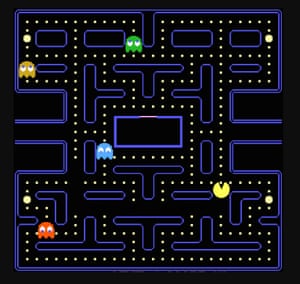What doesn’t kill you makes you stronger. Is that true of the virus? Has it made us a better species, more compassionate, altruistic, more sensitive to the needs of our neighbours, relatives, ourselves?
The revival of community has been one of the more exciting upsides from Covid-19. Homo sapiens got where they did by being cooperative and collaborative, and we’ve seen that on a daily basis: the seed sharers, mask weavers, happy clappers, valiant volunteers, community choirs and online orchestras.
Long story short, community is back. And in two weeks’ time, we are going to explore this more deeply in a livestreamed event to which you are cordially invited. Book early to avoid disappointment – and in this new era of community spirit, get one for your neighbour too. You can also help us out in advance by telling us about your community hero, someone who has been good to have around in a crisis.
In return, I hereby summarise the best of all the optimism on the Guardian site this week:
-
How Covid-19 could transform one of the dirtiest industries – aviation. Three-minute read. (Part of a new mini-series.)
-
The end of plastic? Plant-based bottles that degrade in a year. Two-minute read.
-
How to hire a goat for your Zoom conference call: 90 seconds of silliness.

-
The four-day week – a solution for New Zealand? One-minute read.
-
London’s post-lockdown pedestrian push. Two-minute read.
-
The Parisians rescuing … office plants? One-minute to leaf through.
-
Back to school? What Denmark can teach others. Two-minute lesson.
-
A big change for organ donation. Two-minute read.
-
Sudoku becomes a spectator sport. Quick read or long watch.
-
Taiwan: 24 million people, 440 cases, and only seven deaths. How? Two-minute read.
-
The Chinese man abducted as a toddler, reunited with his parents 32 years later. One-minute read, 45-second video.
Lucky numbers
One in six Londoners may have already had coronavirus. That’s more than a million people who now hopefully benefit from some kind of immunity. About 6,000 have died in hospitals, many more in the community. But that’s still a mortality rate of well under 1%.
Meanwhile, there have been sharp falls in carbon emissions through the pandemic – double-digit declines in many places.
What we liked
We loved this NPR piece, which suggests that we could all learn a few things from Senegal‘s admirable approach to Covid 19.
Good things come to those who wait for marshmallows. Sound advice from Arthur Brooks in the Atlantic.
Also interesting to read this piece about advertising and good news. Perhaps we need a sponsor for the Upside weekly newsletter …
What we heard
We had hundreds of responses to our teacher herogram callout, and I’m really sorry that we can’t feature them all. We’ll try and do more next week …
Dom Frey pays tribute to Anthony Partington, a witty English teacher, now head of Stamford Welland academy:
Inspirational, humorous, talented, witty and a brilliant teacher. As a disengaged student he captured my imagination with his passion for American lit texts and Shakespeare. He really brought them to life for me and completely challenged my (very limited at the time) world view that men could be sensitive, popular and educated at the same time. Sadly, I didn’t grow up in the most diverse environment at the time! He was a breath of fresh air, never afraid to give an opinion or to challenge my personal mediocrity. He inspired me to go to university and be successful and engaging like him when all I wanted to do was coast through life as a 16 year old.
I’m an English teacher now and I’d like to think I rock a little bit of the party boy attitude and pedagogical style with my students as often as I can. I even find myself saying: “will ya bloody shoot oop!” From time to time in his Wigan accent. Thank you, Anthony. Legend!
Laura Parker relives the heady days of Leeds in the 1980s:
Learning Spanish at Roundhay high with Mrs Dronfield changed my life. I went on to do Latin American Studies at university where I learnt Portuguese, spent a year in Brazil and was bitten by the travel bug. In the intervening three decades, I’ve had the good fortune to live and work in many places – including for over 10 years in Bulgaria. There I met my Italian husband with whom I’m now locked down in northern Italy.
I can still muddle through a conversation in Spanish – which this weekend I will with my Spanish brother-in-law – and think of Mrs Dronfield every time I do. Thanks to her rigour, learning Italian was less painful than it might have been.
I would just like her to know that in the hills of Piedmont here’s an English woman speaking Italian and thinking of her brilliant Spanish teacher.
Alison Leonard recalls a moral conundrum:
Olga Wilkinson inspired me. There were times when she discarded the syllabus entirely and challenged us directly with moral problems from history. For instance, when I declared myself a pacifist, she asked me whether, if I found myself standing next to Adolf Hitler and happened to have a gun on me, I would kill him and thus save millions of lives. (I was flummoxed, but went on to study philosophy at university.)
Gillian Fitzgerald fondly remembers an early champion of equality in Liverpool:
We made xylophones in Mr Bleasdale’s class. It was the age of sewing for girls, woodwork for boys, but not with Mr Bleasdale. I sawed, sanded and varnished pieces of wood, ready for Mr Bleasdale to tune each one. He drilled holes in each end, ready for twine to be threaded through. At last, our xylophones were ready. I’ll never forget the thrill of playing a musical instrument I had made.
Luke Bosman remembers language classes with Mike Clark:
I was a shy lad who would naturally have preferred to sit unnoticed, to put my efforts into bookwork and to quietly succeed. Yet somehow he took this boy with a speech impediment (one of the reasons why I hated to speak) and helped me to grow in confidence, such that by the time I had finished my A-levels, for which he had also been one of my Russian teachers, I could speak confidently.
When I qualified as a teacher, I had an interview at a school where, unbeknown to me, he was the head of department. One of the interview questions was, “What motivated you to become a teacher?” I was obliged to answer that my inspiration was sitting to the headteacher’s left. I didn’t get the job.
Jerry Goddard goes back 50 years to a history class in Bedfordshire in the 1960s:
Patrick ‘Harry’ Eavis treated every pupil as if you were three-five years older than you were. Talk about high expectations. ‘So retell the Martin Luther / Diet of Worms impasse with the pope. But why not turn your A4 page sideways and do it in an eight caption comic book style?’ It made you precis in a really creative way. I can remember him playing the violin and joining us sixth formers in carol singing, raising money for Oxfam. He was a liberal socialist and believed in community.
Did it do mean me any good? Well I’m 67 and now retired after a lifelong career in education including teaching, training, writing, advising, directing and now a member of the board of a local university. What success I’ve had in my career was because of trying to emulate his style.
Where was the Upside?
In the race for vaccines: eight volunteers produced Covid-19 antibodies in a US vaccine trial, the first human trial results. And there was more positive vaccine news besides.
Also plenty of potential in our young sportswriter of the year competition. Get your kids writing!
Oh, and happy birthday, Pac-Man!
